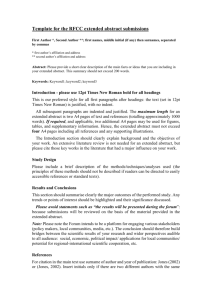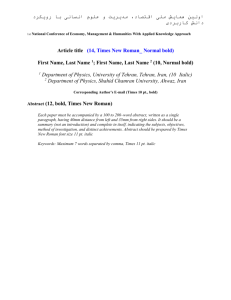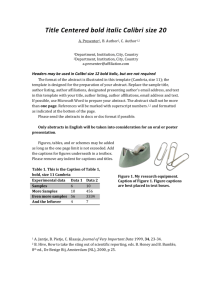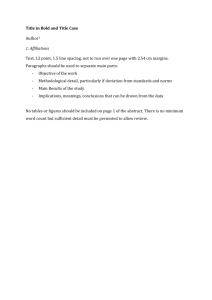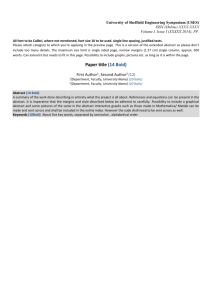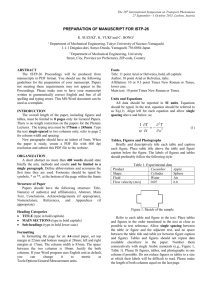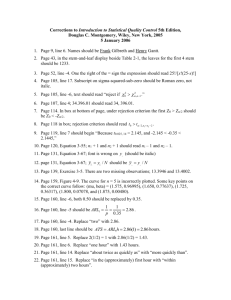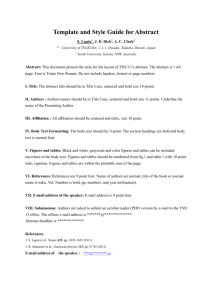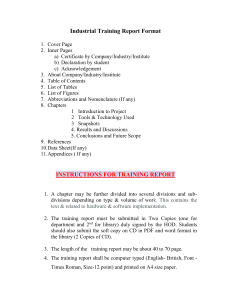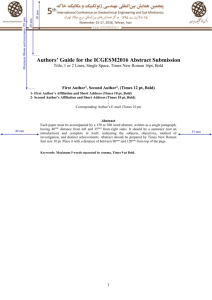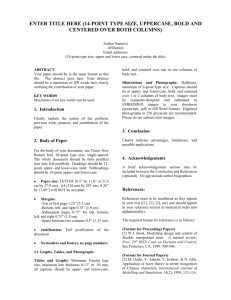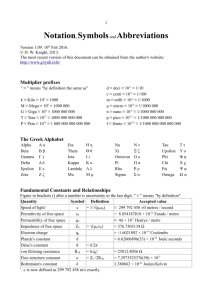Paper template - Materials Science
advertisement
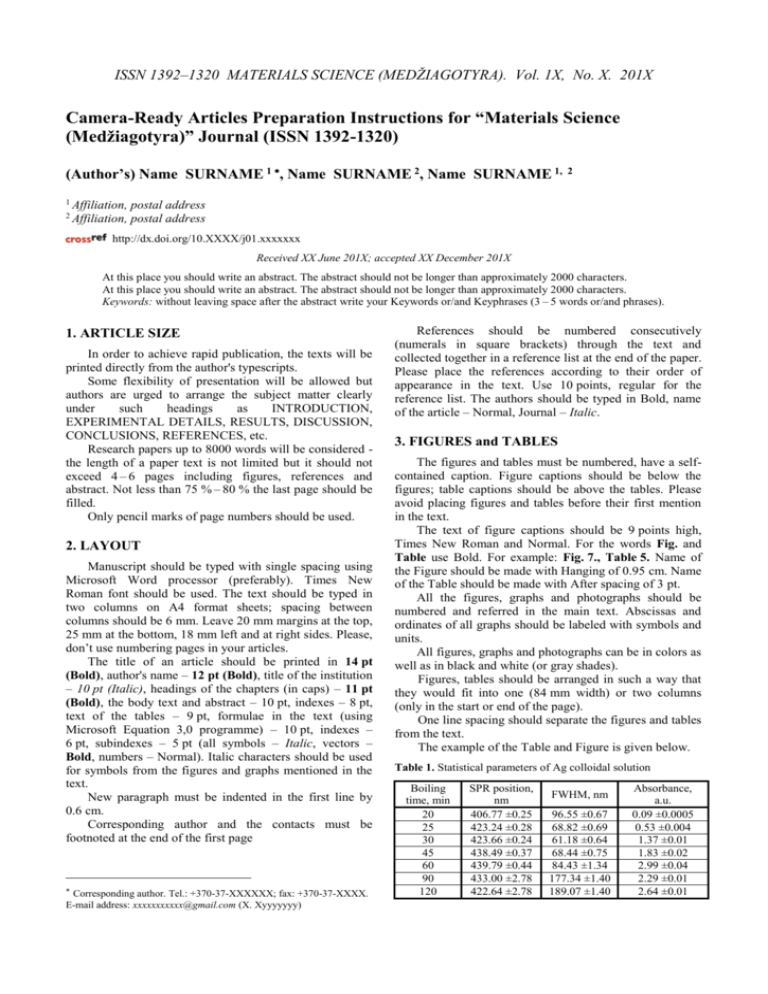
ISSN 1392–1320 MATERIALS SCIENCE (MEDŽIAGOTYRA). Vol. 1X, No. X. 201X Camera-Ready Articles Preparation Instructions for “Materials Science (Medžiagotyra)” Journal (ISSN 1392-1320) (Author’s) Name SURNAME 1 , Name SURNAME 2, Name SURNAME 1, 1 2 2 Affiliation, postal address Affiliation, postal address http://dx.doi.org/10.XXXX/j01.xxxxxxx Received XX June 201X; accepted XX December 201X At this place you should write an abstract. The abstract should not be longer than approximately 2000 characters. At this place you should write an abstract. The abstract should not be longer than approximately 2000 characters. Keywords: without leaving space after the abstract write your Keywords or/and Keyphrases (3 – 5 words or/and phrases). 1. ARTICLE SIZE In order to achieve rapid publication, the texts will be printed directly from the author's typescripts. Some flexibility of presentation will be allowed but authors are urged to arrange the subject matter clearly under such headings as INTRODUCTION, EXPERIMENTAL DETAILS, RESULTS, DISCUSSION, CONCLUSIONS, REFERENCES, etc. Research papers up to 8000 words will be considered the length of a paper text is not limited but it should not exceed 4 – 6 pages including figures, references and abstract. Not less than 75 % – 80 % the last page should be filled. Only pencil marks of page numbers should be used. 2. LAYOUT Manuscript should be typed with single spacing using Microsoft Word processor (preferably). Times New Roman font should be used. The text should be typed in two columns on A4 format sheets; spacing between columns should be 6 mm. Leave 20 mm margins at the top, 25 mm at the bottom, 18 mm left and at right sides. Please, don’t use numbering pages in your articles. The title of an article should be printed in 14 pt (Bold), author's name – 12 pt (Bold), title of the institution – 10 pt (Italic), headings of the chapters (in caps) – 11 pt (Bold), the body text and abstract – 10 pt, indexes – 8 pt, text of the tables – 9 pt, formulae in the text (using Microsoft Equation 3,0 programme) – 10 pt, indexes – 6 pt, subindexes – 5 pt (all symbols – Italic, vectors – Bold, numbers – Normal). Italic characters should be used for symbols from the figures and graphs mentioned in the text. New paragraph must be indented in the first line by 0.6 cm. Corresponding author and the contacts must be footnoted at the end of the first page Corresponding author. Tel.: +370-37-XXXXXX; fax: +370-37-XXXX. E-mail address: xxxxxxxxxxx@gmail.com (X. Xyyyyyyy) References should be numbered consecutively (numerals in square brackets) through the text and collected together in a reference list at the end of the paper. Please place the references according to their order of appearance in the text. Use 10 points, regular for the reference list. The authors should be typed in Bold, name of the article – Normal, Journal – Italic. 3. FIGURES and TABLES The figures and tables must be numbered, have a selfcontained caption. Figure captions should be below the figures; table captions should be above the tables. Please avoid placing figures and tables before their first mention in the text. The text of figure captions should be 9 points high, Times New Roman and Normal. For the words Fig. and Table use Bold. For example: Fig. 7., Table 5. Name of the Figure should be made with Hanging of 0.95 cm. Name of the Table should be made with After spacing of 3 pt. All the figures, graphs and photographs should be numbered and referred in the main text. Abscissas and ordinates of all graphs should be labeled with symbols and units. All figures, graphs and photographs can be in colors as well as in black and white (or gray shades). Figures, tables should be arranged in such a way that they would fit into one (84 mm width) or two columns (only in the start or end of the page). One line spacing should separate the figures and tables from the text. The example of the Table and Figure is given below. Table 1. Statistical parameters of Ag colloidal solution Boiling time, min 20 25 30 45 60 90 120 SPR position, nm 406.77 ±0.25 423.24 ±0.28 423.66 ±0.24 438.49 ±0.37 439.79 ±0.44 433.00 ±2.78 422.64 ±2.78 FWHM, nm 96.55 ±0.67 68.82 ±0.69 61.18 ±0.64 68.44 ±0.75 84.43 ±1.34 177.34 ±1.40 189.07 ±1.40 Absorbance, a.u. 0.09 ±0.0005 0.53 ±0.004 1.37 ±0.01 1.83 ±0.02 2.99 ±0.04 2.29 ±0.01 2.64 ±0.01 Table 2. Example of the Table arranged in the start or end of the page in two columns Composition Tested fabrics Fabrics Weave type I II twill (2/2) plain, twill (2/1) a Area density W, g/m2 211 – 398 96 – 170 FAST KES-F Direction Linear equation R2 Linear equation R2 warp y = 0.24x – 38.33 0.98 y = 0.33x – 56.87 0.98 weft y = 0.13x – 17.27 0.93 y = 0.17x – 26.59 0.92 mean y = 0.18x – 27.80 0.97 y = 0.25x – 41.73 0.96 warp – 0.23 – 0.33 weft y = 0.07x – 4.04 0.77 y = 0.06x – 4.33 0.80 mean y = 0.06x – 1.52 0.57 y = 0.06x – 2.47 0.71 b c d Fig. 1. Example of the Figure arranged in the start or end of the page in two columns Acknowledgments Use the Acknowledgements section if it is necessary. Typed in 10 pt, Normal. REFERENCES 1. Kreibig, U., Vollmer, M. Optical Properties of Metal Clusters. Springer, Berlin, 1995: pp. 203 – 275. 2. Panigrahi, S., Praharaj, S., Basu, S., Ghosh, S. K., Jaha, S., Pande, S., Vo-Dinh, T., Jiang, H., Pal, T. Selfassembly of Silver Nanoparticles: Synthesis, Stabilization, Optical Properties, and Application in Surface-enhanced Raman Scattering The Journal of Physical Chemistry B 110 (27) 2006: pp. 13436 – 13444. Lee, G.-J., Shin, S.-I., Kim, Y.-C., Oh, S.-G. Preparation of Silver Nanorods through the Control of Temperature and pH of Reaction Medium Materials Chemistry and Physics 84 (2 – 3) 2004: pp. 197 – 204. Fig. 2. SPR position dependence on boiling time (determined from the experimental data) 4. CONCLUSIONS We thank you in advance for the usage carefully of instructions for camera-ready articles, which can be sent for publication with minor modification. The example of article published in Materials Science (Medžiagotyra) is available at the Web Portal http:www.matsc.ktu.lt 3.
